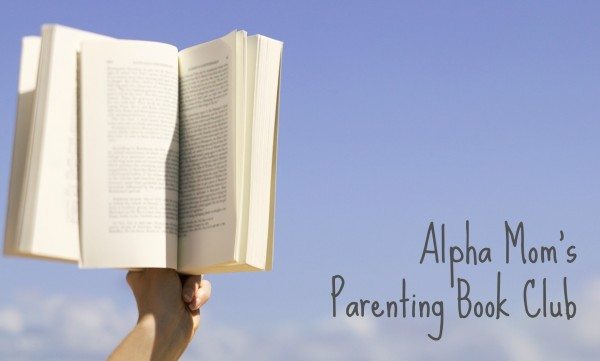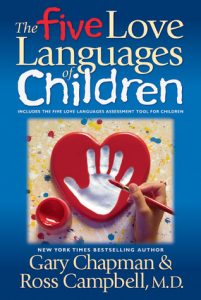
Alpha Mom Parenting Book Club: The Five Love Languages Of Children
 When I read The 5 Love Languages of Children years ago it truly revolutionized the way I parented my children. I remember there were several moments while reading when a light bulb would go off and I wanted to smack myself on the forehead for missing what seemed, in retrospect, so obvious. Rereading the book this time I was struck by how much I had forgotten about the different love languages and the way they manifest themselves.
When I read The 5 Love Languages of Children years ago it truly revolutionized the way I parented my children. I remember there were several moments while reading when a light bulb would go off and I wanted to smack myself on the forehead for missing what seemed, in retrospect, so obvious. Rereading the book this time I was struck by how much I had forgotten about the different love languages and the way they manifest themselves.
Yesterday I was having an email exchange with Isabel and I told her I was having my oldest son’s high school football team over for dinner that night. She replied that his love language must be “acts of service.” I emailed back that No, it was my love language and that is why I always end up volunteering for things. I show my love by doing things for other people. Unfortunately, as I am sure all of you already know who have read the book, the way that we personally feel loved, and therefore show love, is not the way that other people feel loved.
But then the more I thought about this particular son I realized that “acts of service” is his primary love language as well. He goes to all his younger brother’s football games, he makes cards for them on their birthdays, and he will play with them on the trampoline. I had always thought his love language was “gifts,” but then I noticed that while he does like gifts (I mean who doesn’t like a gift!) when he receives the gift he always says something like, “Thank you so much for going to the store and getting this.” Even to him, the gift represents an act of service, of someone doing something nice for him. I think if you were to ask him how he knows I love him he would say: “my mom packs me a lunch every day (act of service), she does my laundry (act of service), she comes to all my games (act of service), she listens to me when I talk (words of affirmation).”
 I think the love language “gifts” is the most difficult to reconcile with our children’s personalities. First of all, it seems so materialistic and consumer-driven, like the child is greedy or selfish. Second of all, all kids like gifts, don’t they?
I think the love language “gifts” is the most difficult to reconcile with our children’s personalities. First of all, it seems so materialistic and consumer-driven, like the child is greedy or selfish. Second of all, all kids like gifts, don’t they?
What I have discovered with my children and love languages is that your children will reveal to you what their love language is by the way they express love to other people.
Do they wrap up treasures from their room and give them to you? Do they routinely make bookmarks, duct-tape wallets, or bracelets for their friends and family? If you are out shopping with them do they point out things that you should buy for other people? Do they get excited by a gift no matter how expensive or cool it is? To these kids, the “gift” is a physical manifestation of love. It isn’t about commercialism.
According to the authors, The 5 Love Languages of Children are:
1) physical touch,
2) words of affirmation,
3) quality time,
4) gifts, and
5) acts of service
One of those five is the primary love language.
If you don’t speak that language, your child will not feel loved, no matter how much love you show them in other ways. I have discovered with my own children that most of them are “bilingual,” to keep with the language metaphor. Yes, one love language does inch out the others, but all my children have a second language that is almost as strong.
My oldest son, I mentioned above, is also fluent in the “words of affirmation” love language. He has little notes I wrote to him years ago still saved in his room. As a comparison, I wrote one of my younger sons a note and put it in his lunch bag. He never even mentioned it to me. When I asked if he had read it he replied, “Yeah. Thanks.” The note had been thrown away after lunch.
I think what this book has helped me realize the most is to not take things personally. I could have felt hurt that my younger son barely acknowledged the encouraging note I wrote to him. Instead, I laughed to myself. While he liked getting a note in his lunch, it doesn’t attach the same importance as it does to someone who’s love language is “words of affirmation.” This doesn’t mean that as a parent you shouldn’t still do these little things for your kids that aren’t their “love language” because they do like and appreciate them. It just means that as a parent you have to recognize that those things are not the ones filling up their “love tanks.”
“Nearly all parents deeply love their children, yet not all children feel unconditional love and care.”
This quote has always struck me. As an adult, I hear many other adults say, “I never really felt like my parents loved me. Oh they took care of me and they weren’t mean to me, but I never felt really loved.” What a tragedy that is, to never have felt loved by the most important people in your life. Their parents likely had no idea, nor were the kids able to verbalize why they didn’t feel loved. After rereading this book it is at the forefront of my mind to make sure that I am consciously showing each of my children love in the way that makes them feel loved.
Another passage that stood out for me this time around was, “Asking ourselves, What can I do to correct my child’s behavior? often leads to thoughtless punishment. Asking, What does my child need, lets us proceed with confidence that we will handle the situation well.” I have one child who has been particularly trying lately. Reading this helped me reframe what has been going on. What does this child need? Undivided attention from me. And he has been making sure he got it by having fits over his homework every night, but that is not the kind of attention he really wants. And I promise you, it is not the kind of attention I want to be giving. His primary language is “quality time.”
I think this book also highlighted for me how different children can have vastly different needs within the same family. A one-size approach to parenting doesn’t work. I wonder if this could explain why children from the same family can have different views on their experiences growing up. Some children did not have what the authors refer to as having “their love tanks filled.”
With some of my children, it hasn’t been immediately clear what their love language is. I have had to take time and really examine what makes them feel the most loved. The authors, Gary Chapman and Ross Campbell, do have a website with an assessment test that might be helpful.
Book Club Members, would love for you to discuss the following in the comments section:
1. What about the book struck you?
2. Is there anything that changed the way you thought about parenting your kids?
3. Did you recognize yourself or any of your children in the scenarios?
4. Have you shared your child’s love language with other people who interact with your child?
If you have any questions yourself, please ask them below and we can discuss with one another using the “Reply” button on that comment.
****************
Here are the discussions for our other picks: Far From The Tree, NurtureShock, and How To Talk So Kids Will Listen.

